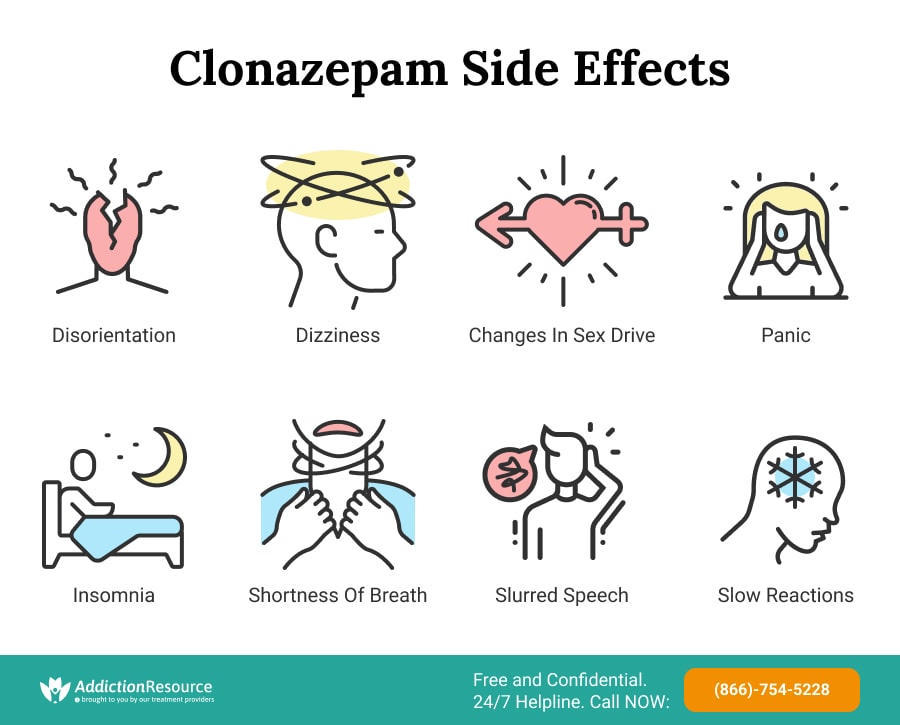Klonopin is often prescribed for anxiety disorder, panic disorder, and seizures. However, the drug can potentially cause negative adverse reactions. The side effects of Clonazepam may affect an individual both physically and psychologically. Furthermore, Klonopin effects can be both short-term and long-term. This article aims to provide more information about Klonopin side effects and how to get the best medical assistance to deal with them.
Table Of Contents:
How Does Klonopin Make You Feel?
Klonopin is a depressant, and because of that, its effects essentially slow the body. The drug often makes users fatigued and dreary, amongst other things. Klonopin effects range from making the user extremely tired and down to making them social and maybe even a little over the top.

Clonazepam is a fast-acting drug, and usually kicks in within less than an hour. Clonazepam can last 8-10 hours depending on the user and several factors related to their health, size, and lifestyle. The dosage of the substance they have taken is also an influencing factor. In those 8-10 hours, the user may experience a range of feelings, from fatigue to complete sedation and feeling like a zombie. Some users even experience blackouts.
Klonopin May Also Make Users Do Things in Excess, Such As:
- Abuse other substances more. As a depressant, it can lower inhibitions and cause users to abuse other drugs and take more.
- Eat and drink more. Clonazepam can cause food cravings.
- Increased desire to socialize. Although the medication is a sedative, the user may become more sociable due to a lack of inhibitions or anxiety holding them back.
- Increased fatigue and desire to sleep. The drug’s sedative effects make some users constantly tired.
Short-Term Side Effects of Klonopin Consumption
Contrary to many people’s beliefs, Klonopin can be as dangerous with excessive short-term use as it may be with excessive long-term use. The side effects of Klonopin short-term use cause both physical and psychological harm to the user’s health and place a strain on relationships.
Short-Term Clonazepam Side Effects Include:
- Extreme Numbness. The drug may reduce the ability to feel physical pain.
- Cognitive Impairment. Users often don’t think as logically or as quickly as they usually would. Balance and day-to-day activities may also be affected.
- Dizziness. The medication can cause individuals to feel wobbly on their feet as well as disoriented.
- Memory Loss And Inability To Recall Recent Events. Klonopin effects cause the user to forget recent events or memories, which can strain relationships.
- Confusion. Often linked to memory loss, users may be confused about their whereabouts, state and more.
- Fainting. Short-term Klonopin abuse can cause fainting or even blackouts.
- Slow Reactions. This is, again, due to central nervous system depression. Reaction times can slow and drop a surprising amount.
- Inability To Judge Situations. Often due to cognitive impairment, users cannot judge situations as well.
- No Sex Drive. Central nervous system depression can also cause a lack of interest in sex.
Another short-term adverse reaction is depression. Many of those who take it in higher doses experience depression and thoughts of suicide. This is also common in those who take Clonazepam for sleep as they have to take larger amounts to quell their anxiety symptoms.
The effects can become more severe if users mix Klonopin and other substances at the same time.
Long-Term Adverse Reactions
Abusing Clonazepam in the long term can further enhance the adverse reactions of short-term abuse. It is sometimes the trigger for new symptoms to emerge and continue to cause health deterioration. Klonopin side effects mean it is rarely prescribed in the long-term as it can be very addictive. However, some users choose to find a way to abuse the drug in the long term by doctor shopping.
The Side Effects Of Klonopin Long-Term Abuse Consist Of:
- Addiction. Long-term abuse of the drug can lead to a reliance on it.
- Tolerance. Those who use Clonazepam for long enough often build up the tolerance to the drug. It then means they have to take more to get the same result and have a higher chance of Clonazepam overdose.
- Relapse anxiety. Long-term use may lead to tolerance, so the original anxiety often comes back but worse than before.
- Panic. The return of anxiety can often trigger panic disorder and panic attacks.
- Insomnia. The return of fear may also make it very challenging to sleep.
- Being Short Of Breath. Depression of the central nervous system can make even breathing more difficult.
Some of the short-term Clonazepam side effects may also be enhanced when the user abuses the drug in the long term. For example, memory loss or depression can become more severe than if the medication is taken short-term.
Klonopin and Dementia
With the increased use of certain psychoactive agents such as benzodiazepines, researchers must look at the long-term effects of these drugs on mental health, even as people use them to treat short-term conditions. Evidence linking benzodiazepine use to dementia has been conflicting at best. However, a recent study published in 2017 recognized a positive link between the use of benzodiazepines like Klonopin and dementia.

The study showed that the risk was higher with drugs that had a long half-life (>20 hours) and which were taken for a long duration (>3 years). Therefore it stands to reason that a drug such as Klonopin may increase the risk of developing dementia later on in life due to its long half-life and potent action.
Klonopin While Pregnant
Clonazepam is categorized as a pregnancy category D drug. It means that the drug use may carry significant risk to the fetus but may be justified in life-threatening situations when a doctor can’t find any other suitable alternative. Using benzodiazepines during pregnancy has always been somewhat controversial. Some studies have linked exposure to certain benzodiazepines such as Clonazepam to an increased risk of developing certain congenital malformations such as cleft lip and cleft palate. However, several studies carried out to determine the truth behind this claim have found no significant link between the use of the medication and an increased incidence of birth defects.
Getting Medical Help For Abuse
Klonopin is a beneficial medication if it is administered and taken correctly in the dosage recommended. However, when it is abused, it can be highly addictive and high dosages can lead to dangerous adverse reactions. One should seek medical assistance and treatment if any Klonopin side effects become noticeable because of its dangers.
If one is suffering from Clonazepam side effects, then it is essential to find a medical professional to guide away from abusing the drug. Contacting a doctor can help deal with the adverse reactions and a developing addiction, if it is present.
In case of tolerance or addiction to the medication, addiction treatment can be offered. It can include either inpatient or outpatient rehabs. The medical help during this period can help with the withdrawal symptoms and make quitting much easier.
Hope Without Commitment
Find the best treatment options. Call our free and confidential helpline
Most private insurances accepted
Page Sources
- Lin, A. E., Peller, A. J., Westgate, M. N., Houde, K., Franz, A., & Holmes, L. B. (2004). Clonazepam use in pregnancy and the risk of malformations. Birth Defects Research Part A: Clinical and Molecular Teratology, 70(8), 534-536. https://pubmed.ncbi.nlm.nih.gov/15329832/
- He, Q., Chen, X., Wu, T., Li, L., & Fei, X. (2019). Risk of Dementia in Long-Term Benzodiazepine Users: Evidence from a Meta-Analysis of Observational Studies. Journal of clinical neurology (Seoul, Korea), 15(1), 9–19. https://doi.org/10.3988/jcn.2019.15.1.9
- U.S. National Library of Medicine, Clonazepam. https://medlineplus.gov/druginfo/meds/a682279.html
- Lahon, K., Shetty, H. M., Paramel, A., & Sharma, G. (2011). Sexual dysfunction with the use of antidepressants in a tertiary care mental health setting - a retrospective case series. Journal of pharmacology & pharmacotherapeutics, 2(2), 128–131. https://doi.org/10.4103/0976-500X.81913
- Mejo, S. L. (1992). Anterograde amnesia linked to benzodiazepines. The Nurse Practitioner, 17(10), 44-49. https://pubmed.ncbi.nlm.nih.gov/1357612/
- Food and Drug Administration, Klonopin Tablets, 2017. https://www.accessdata.fda.gov/drugsatfda_docs/label/2017/017533s059lbl.pdf

 Authored by
Authored by  Reviewed by
Reviewed by 
